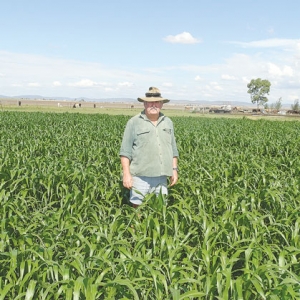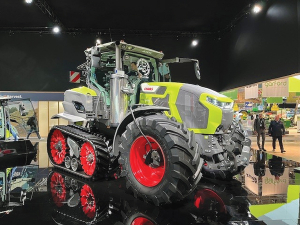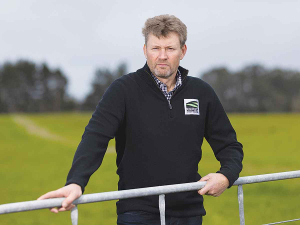Installing a lateral-move irrigator was one of the best investments Australian farmer Peter Smith has ever made.
The 285m precision watering system is at the heart of the least-cost dairy enterprise Peter and his wife Debbie operate in the Nobby district, Darling Downs, Queensland.
The low pressure, low maintenance irrigator and a travelling gun allow them to make full use of a reliable water supply from two 13m bores and they grow virtually all their own feed.
“We are lucky with our water supply, something which is essential on our good self-mulching black soils. You just couldn’t dairy here without it,” Smith says. “Plenty of water and urea equals plenty of feed.”
The couple have been dairying for 18 years, having moved to the Downs from a coastal property on the Albert River near Beenleigh.
“When we came up here there was plenty of dairying in this area but a lot of farms are now growing vegetables,” says Smith.
Access to good irrigation has allowed them to grow summer and winter feed with the only bought-in feed being about 1kg of grain pellets fed in the bails at each milking.
“Six tonnes of pellets lasts us about a month,” he says.
“We’ve reduced our inputs as much as we can, but with dry weather, our electricity bills for irrigation have been a killer, averaging $5000-$8000 a quarter on the cheapest night tariff.”
In response to bleak dairy prospects, the couple have reduced their cow numbers to allow a diversification into commercial lucerne production. Their 66ha property is under intensive cropping year round to feed about 70 milkers and supply a ready local horse market with lucerne hay.
Their milking herd has a strong infusion of Brown Swiss bloodlines. “They have a brilliant temperament and longevity. We’ve got one cow still going at 18 years with the herd averaging about 10 lactations,” Smith says.
“They are also hardy cattle which tolerate hot and cold conditions well. They have low cell counts and good milk composition which provides us with the bonus payments we need to stay in business.”
Some of his best performers are about a quarter Jersey, a quarter Friesian and half Brown Swiss. An Angus bull is used to provide calves with a higher commercial value.
The Smiths grow crops of rye and clover and oats in a couple of plantings for winter forage. The oats provides quick, early season feed with the annual rye providing grazing through until about the end of November.
The winter months are their best production period and Smith says their year-round calving was skewed to take advantage of the good body of feed at that time of year.
The herd averages about 22L/day through winter months with about 4.5% butterfat and 3.5% protein.
During the summer months, the feed mainstay is forage sorghum, with a fresh strip fed after each milking. The sorghum provides fast growing feed and is ready for grazing when 600-700mm high.
With careful grazing management and regular water and urea the crop can recover in six weeks for feeding up to five times during the season.
The cattle are moved off when they have finished feeding to a couple of kikuyu ‘camping’ paddocks.


















